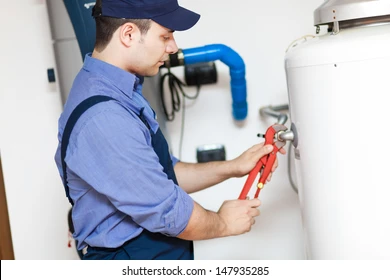A functional water heater is essential for every household, providing hot water for showers, cleaning, and cooking. However, when your water heater stops working correctly, it can disrupt daily routines. Residential water heater repair services specialize in identifying and fixing issues quickly, restoring comfort and efficiency to your home. Here’s what you need to know about Residential Water Heater Repair Services, from common problems to understanding the repair process and why hiring a professional matters.
Common Issues with Residential Water Heaters
Water heaters can encounter various issues over time, often related to wear, maintenance needs, or faulty parts. Here are some frequent problems homeowners experience:
No Hot Water
This is one of the most common issues and can stem from problems with the thermostat, heating elements, or pilot light.
Inconsistent Water Temperature
Fluctuating water temperature may result from a malfunctioning thermostat or sediment buildup in the tank.
Leaks
Leaks around the water heater can indicate issues with the tank, valves, or connections, and may lead to water damage if not fixed.
Strange Noises
Rumbling or popping sounds often signal sediment buildup at the tank’s bottom, which can affect the unit’s efficiency.
Rusty or Discolored Water
This is usually due to corrosion inside the tank or rusted anode rods and may impact water quality and taste.
Low Water Pressure
Buildup in the pipes or the tank can restrict water flow, leading to low water pressure and inefficient water heating.
Steps Involved in Residential Water Heater Repair
Initial Inspection and Diagnosis
When you contact a water heater repair service, the first step is a thorough inspection. Technicians examine the water heater’s parts, test the thermostat, check for sediment buildup, and inspect for leaks or faulty connections. This step is crucial to identifying the root cause of the problem accurately.
Thermostat and Heating Element Repairs
If the water heater isn’t heating effectively, the thermostat or heating elements may need replacement or repair. For electric water heaters, technicians test each heating element and thermostat and replace any defective parts. For gas heaters, they ensure the pilot light and gas supply are functioning correctly.
Sediment Flushing and Cleaning
Sediment buildup is a common problem with water heaters, reducing efficiency and causing strange noises. A repair service will flush the tank to remove sediment, improving the heater’s performance and lifespan.
Replacing Corroded Parts
Water heaters are susceptible to corrosion, especially in the anode rod, which helps protect the tank from rust. Technicians may need to replace the anode rod if it’s worn or corroded, preserving the tank’s integrity and preventing rust from contaminating your water.
Fixing Leaks and Sealing Connections
Leaks can occur due to faulty valves, worn seals, or even cracks in the tank. Repair services will examine all valves and connections, tightening or replacing as needed, to prevent further water loss and potential water damage.
Benefits of Hiring Professional Water Heater Repair Services
Expertise and Safety
Working with hot water heaters can be dangerous, especially with electric or gas connections. Licensed technicians have the expertise to handle repairs safely, reducing the risk of injury or additional damage.
Timely and Reliable Repairs
Professional repair services have the tools and experience needed to diagnose and fix issues efficiently. This can prevent prolonged disruptions and reduce the risk of further damage.
Prolonged Lifespan of Your Water Heater
Regular maintenance and timely repairs by professionals can extend the lifespan of your water heater, ensuring it runs efficiently for years to come.
Enhanced Efficiency and Lower Utility Bills
A well-maintained water heater operates more efficiently, which can lower energy bills. Repair services ensure all parts are functioning correctly, preventing energy wastage.
New Techniques in Water Heater Repair
Water heater technology is evolving, and so are the techniques for repairing and maintaining these essential home appliances. With advancements in tools, diagnostics, and repair processes, professionals can now fix water heaters more efficiently and effectively. Here are some of the latest techniques in water heater repair that help extend the life of the unit, improve energy efficiency, and enhance performance.
Advanced Diagnostic Tools
Modern diagnostic tools enable technicians to identify issues with greater accuracy. Using infrared cameras, digital multimeters, and smart probes, professionals can detect problems such as leaks, faulty heating elements, or thermostat issues without extensive disassembly. This saves time and reduces the guesswork, leading to faster and more precise repairs.
Ultrasonic Cleaning for Sediment Removal
Sediment buildup is one of the most common issues in water heaters, affecting efficiency and lifespan. A new technique called ultrasonic cleaning uses sound waves to break up sediment and mineral deposits without chemicals or harsh scrubbing. This method is highly effective in gas and electric water heaters and helps improve water heating efficiency.
Smart Anode Rod Replacement
Traditional anode rods protect the water heater tank from corrosion but need regular replacement. New smart anode rods are equipped with sensors that notify homeowners or technicians when replacement is due. This innovation prevents corrosion before it starts, extending the lifespan of the water heater and minimizing the risk of tank leaks.
Tankless Water Heater Retrofit
For homeowners with older, inefficient tank water heaters, technicians can now perform a tankless water heater retrofit. By adding a tankless system or converting an existing tank heater to a hybrid setup, this technique provides endless hot water and greater energy efficiency. Retrofitting is becoming increasingly popular as it reduces energy consumption and can lower utility bills over time.
Leak Detection Sensors
New leak detection sensors are another recent addition to water heater repair. These sensors are installed near the water heater and monitor for leaks or moisture. If a leak is detected, the sensor alerts the homeowner, allowing for prompt repairs before any water damage occurs. This preventative approach helps maintain the water heater’s condition and prevents costly repairs.
Conclusion
When selecting a repair service, look for a plumber company with experience, excellent reviews, and proper licensing. Quality plumber companies often offer a satisfaction guarantee, ensuring the problem is fixed correctly. Additionally, many services provide emergency repairs for urgent water heater issues.





